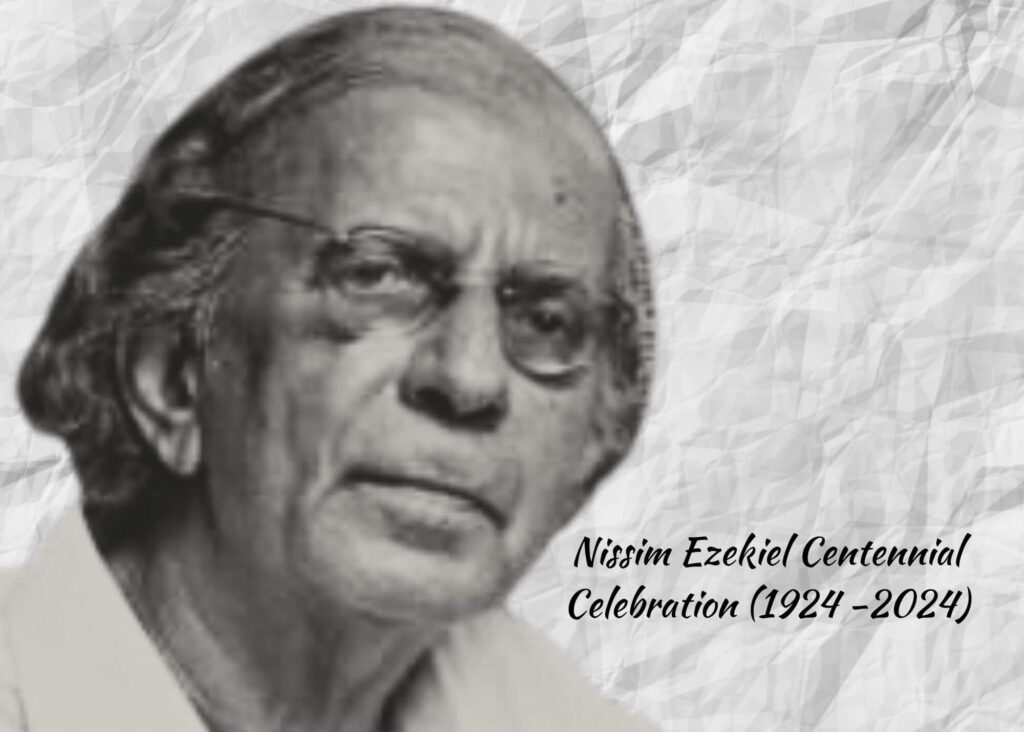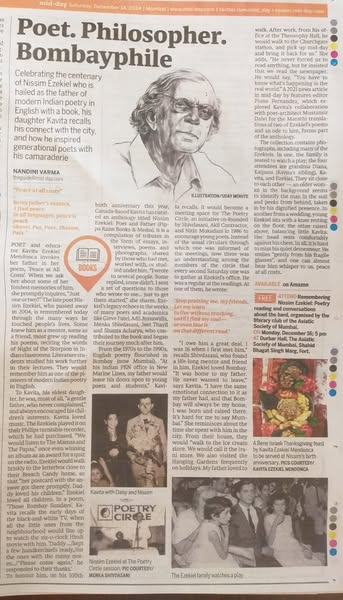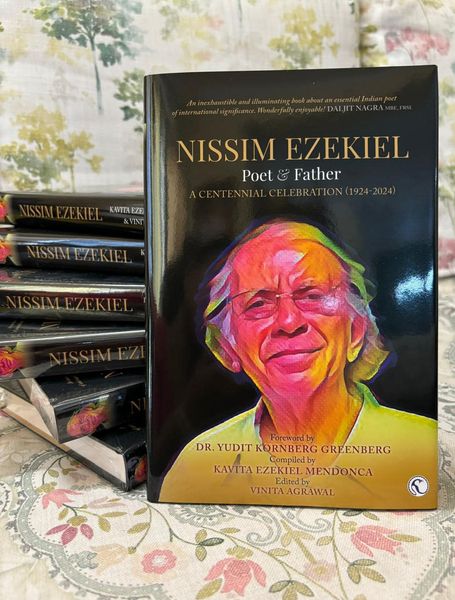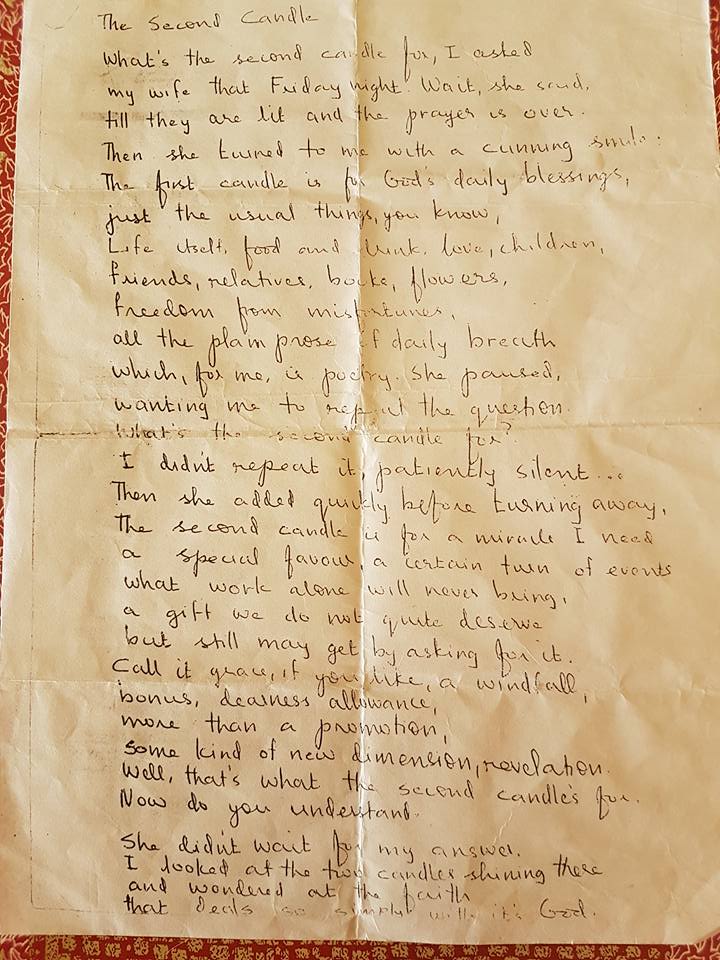This page is an eclectic collection of things ‘Nissim Ezekiel’ – a treasured, precious, handwritten poem, a video, a twitter announcement from MyGovIndia on his 96th birthday, links to a few articles, two poems ‘Background Casually’ and ‘Enterprise’.
A Daughter’s Love Letter to her Father: Review of the Centennial Celebration Volume by Urna Bose in Different Truths Magazine, Dec 16 2024
https://www.differenttruths.com/a-daughters-love-letter-to-her-father-nissim-ezekiel/

Another wonderful article in advance of my father’s Centennial birth anniversary in the Mumbai Mid-Day of 14 Dec 2024. (Mumbai Guide / Things to do section). My special thanks go out to team Mid-Day, a newspaper I have loved since very young.

The Nissim Ezekiel Centennial Celebration Volume

Nissim Ezekiel reading ‘The Railway Clerk’. This is the only recording of my father’s voice I can locate. Click on the Video button, below, to see the YouTube video. If readers find any recordings, I would be most grateful if you would email me the links.
Vintage Father: A Doorway to His Heart — Kavita Ezekiel Mendonca on Nissim Ezekiel
The Second Candle

Nissim Ezekiel’s ‘A Time To Change’ at 70.
Karthik Venkatesh 16 June 2022 1:30 AM
Nissim Ezekiel’s ‘A Time To Change’ at 70.
https://www.news9live.com/art-culture/books/nissim-ezekiels-a-time-to-change-at-70-how-the-prolific-poet-with-his-first-book-heralded-new-era-of-indian-english-poetry-176723?fbclid=IwAR3g_0DhFK95bVxRgUG6I2OEPaQYqrk09rk9_gbF1LtM2icDlfwXUBNfPTI
- With Ezekiel, it is difficult to stop at merely calling him a poet and sketching the details of his poetic accomplishments. For decades after his debut, Ezekiel was not just a poet, he was ‘the poet’, in the sense that he was the embodiment of the modern Indian English poet, asserting his right to write and publish in English.
- He defended the choices that many like him had made — of choosing to write in English — at a time when newly-independent India was attempting to shed its colonial baggage and find its own distinct voice in the modern world.
- Throughout he remained committed to India. As a Bene Israeli Jew, he did have the option of migrating to Israel, but chose not to. India remained his home and he continued to write, edit and publish here all his life.

Some articles on Nissim Ezekiel
Background, Casually A poet-rascal-clown was born, The frightened child who would not eat Or sleep, a boy of meager bone. He never learned to fly a kite, His borrowed top refused to spin. I went to Roman Catholic school, A mugging Jew among the wolves. They told me I had killed the Christ, That year I won the scripture prize. A Muslim sportsman boxed my ears. I grew in terror of the strong But undernourished Hindu lads, Their prepositions always wrong, Repelled me by passivity. One noisy day I used a knife. At home on Friday nights the prayers Were said. My morals had declined. I heard of Yoga and of Zen. Could 1, perhaps, be rabbi saint? The more I searched, the less I found. Twenty two: time to go abroad. First, the decision, then a friend To pay the fare. Philosophy, Poverty and Poetry, three Companions shared my basement room. The London seasons passed me by. I lay in bed two years alone, And then a Woman came to tell My willing ears I was the Son Of Man. I knew that I had failed In everything, a bitter thought. So, in an English cargo ship Taking French guns and mortar shells To Indo China, scrubbed the decks, And learned to laugh again at home. How to feel it home, was the point. Some reading had been done, but what Had I observed, except my own Exasperation? All Hindus are Like that, my father used to say, When someone talked too loudly, or Knocked at the door like the Devil. They hawked and spat. They sprawled around. I prepared for the worst. Married, Changed jobs, and saw myself a fool. The song of my experience sung, I knew that all was yet to sing. My ancestors, among the castes, Were aliens crushing seed for bread (The hooded bullock made his rounds). One among them fought and taught, A Major bearing British arms. He told my father sad stories Of the Boer War. I dreamed that Fierce men had bound my feet and hands. The later dreams were all of words. I did not know that words betray But let the poems come, and lost That grip on things the worldly prize. I would not suffer that again. I look about me now, and try To formulate a plainer view: The wise survive and serve–to play The fool, to cash in on The inner and the outer storms. The Indian landscape sears my eyes. I have become a part of it To be observed by foreigners. They say that I am singular, Their letters overstate the case. I have made my commitments now. This is one: to stay where I am, As others choose to give themselves In some remote and backward place. My backward place is where I am.
Enterprise It started as a pilgrimage Exalting minds and making all The burdens light, The second stage Explored but did not test the call. The sun beat down to match our rage. We stood it very well, I thought, Observed and put down copious notes On things, the peasants sold and bought The way of serpents and of goats. Three cities where a sage had taught. But when the differences arose On how to cross a desert patch, We lost a friend whose stylish prose Was quite the best of all our batch. A shadow falls on us and grows. Another phase was reached when we Were twice attacked, and lost our way. A section claimed its liberty To leave the group. I tried to pray. Our leader said he smelt the sea. We noticed nothing as we went, A straggling crowd of little hope, Ignoring what the thunder meant, Deprived of common needs like soap. Some were broken, some merely bent. When, finally, we reached the place, We hardly know why we were there. The trip had darkened every face, Our deeds were neither great nor rare. Home is where we have to earn our grace.
